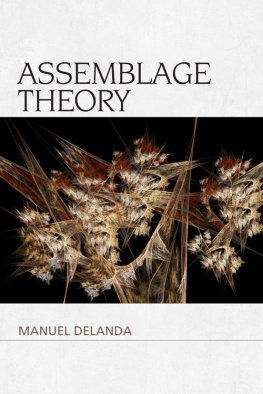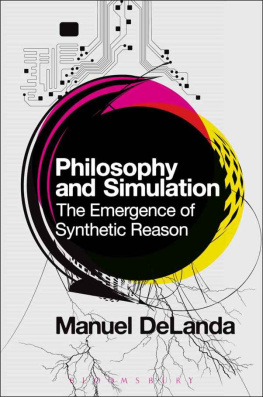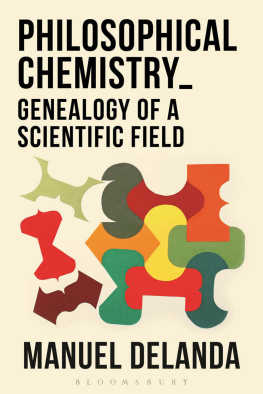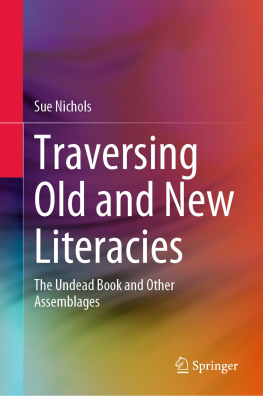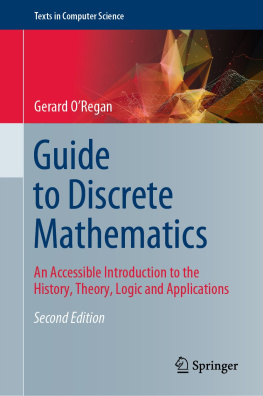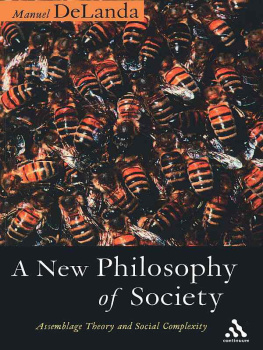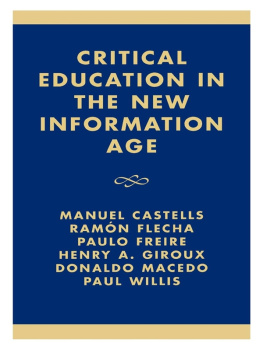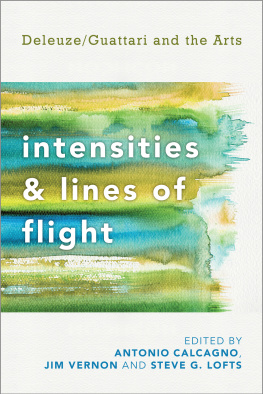Assemblage Theory
Speculative Realism
Series Editor: Graham Harman
Since its first appearance at a London colloquium in 2007, the Speculative Realism movement has taken continental philosophy by storm. Opposing the formerly ubiquitous modern dogma that philosophy can speak only of the human-world relation rather than the world itself, Speculative Realism defends the autonomy of the world from human access, but in a spirit of imaginative audacity.
Editorial Advisory Board
Jane Bennett
Levi Bryant
Patricia Clough
Mark Fisher
Iain Hamilton Grant
Myra Hird
Adrian Johnston
Eileen A. Joy
Books available
Onto-Cartography: An Ontology of Machines and Media by Levi R. Bryant
Form and Object: A Treatise on Things by Tristan Garcia, translated by Mark Allan Ohm and Jon Cogburn
Adventures in Transcendental Materialism: Dialogues with Contemporary Thinkers by Adrian Johnston
The End of Phenomenology: Metaphysics and the New Realism by Tom Sparrow
Fields of Sense: A New Realist Ontology by Markus Gabriel
Quentin Meillassoux: Philosophy in the Making Second Edition by Graham Harman
Assemblage Theory by Manuel DeLanda
Forthcoming titles
Romantic Realities: Speculative Realism and British Romanticism by Evan Gottlieb
Garcian Meditations: The Dialectics of Persistence in Form and Object by Jon Cogburn
After Quietism: Analytic Philosophies of Immanence and the New Metaphysics by Jon Cogburn
Infrastructure by Graham Harman
Visit the Speculative Realism website at edinburghuniversitypress.com/series/specr
Assemblage Theory
Manuel DeLanda
EDINBURGH
University Press
Edinburgh University Press is one of the leading university presses in the UK. We publish academic books and journals in our selected subject areas across the humanities and social sciences, combining cutting-edge scholarship with high editorial and production values to produce academic works of lasting importance. For more information visit our website: www.edinburghuniversitypress.com
Manuel DeLanda, 2016
Edinburgh University Press Ltd
The Tun Holyrood Road,
12(2f) Jacksons Entry,
Edinburgh EH8 8PJ
Typeset in 11/14 Adobe Sabon by
IDSUK (DataConnection) Ltd, and
printed and bound in Great Britain by
CPI Group (UK) Ltd, Croydon CR0 4YY
A CIP record for this book is available from the British Library
ISBN 978 1 4744 1362 6 (hardback)
ISBN 978 1 4744 1364 0 (webready PDF)
ISBN 978 1 4744 1363 3 (paperback)
ISBN 978 1 4744 1365 7 (epub)
The right of Manuel DeLanda to be identified as the author of this
work has been asserted in accordance with the Copyright,
Designs and Patents Act 1988, and the Copyright and
Related Rights Regulations 2003 (SI No. 2498).
Contents
Acknowledgements
The publishers acknowledge that some material has been previously published in the following collections:
Deleuzian Social Ontology and Assemblage Theory, in Deleuze and the Social , ed. Martin Fuglsang and Bent Meier Srensen (Edinburgh: Edinburgh University Press, 2006).
Deleuze, Materialism, and Politics, in Deleuze and Politics , ed. Ian Buchanan and Nicholas Thoburn (Edinburgh: Edinburgh University Press, 2008).
Molar Entities and Molecular Populations in History, in Deleuze and History , ed. Jeffrey Bell and Claire Colebrook (Edinburgh: Edinburgh University Press, 2009).
Deleuze in Phase Space, in Virtual Mathematics , ed. Simon Duffy (Manchester: Clinamen Press, 2006).
Various essays in Deleuze: History and Science (New York: Atropos Press, 2011).
Series Editors Preface
It is a pleasure for this series to host the publication of Manuel DeLandas Assemblage Theory , the most recent and perhaps most lucid statement of his philosophy that we have. DeLanda is well known to Anglophone readers of continental philosophy especially among Deleuzeans as a respected innovator in this sub-field since the 1990s. He reached his current level of importance along a highly unorthodox career path that began with film-making, passed through an astonishing period of self-education in philosophy, and came to fruition in 1991 with the first of numerous influential books. He has worked as an adjunct professor in prestigious schools of architecture, and for some years as a faculty member at the European Graduate School in Saas-Fee, Switzerland. All the while he has been largely ignored by professors of philosophy but adored by graduate students a demographic profile that usually indicates a thinker of high calibre, a full generation ahead of peers. DeLandas popularity shows an additional element of paradox since his ontology is an uncompromising realism , still a minority position among continental thinkers despite the onset of a broader speculative realism movement.
DeLanda was born in Mexico City in 1952 and moved in the 1970s to New York, where he lives to this day in a spirit of understated bohemianism. As a student and practititioner of experimental film, he circulated in the New York art scene and acquired some international renown. The Manuel DeLanda we know today first emerged in roughly 1980, when he began to shift his focus to computer art and computer programming. In an effort to understand his equipment properly, DeLanda resolved to teach himself symbolic logic, a decision that soon led him to the classic writers of analytic philosophy, which may help explain the clarity of his writing style. After a time he worked his way into the rather different intellectual atmosphere of Gilles Deleuze and Flix Guattari, in whose works DeLanda found both a materialism and a realism, though realist is a word rarely applied to Deleuze by his other admirers.
In 1991, not yet forty years old, DeLanda joined the authorial ranks with his debut book, War in the Age of Intelligent Machines . It is worth noting that this book was written just before the Persian Gulf War and General Schwarzkopfs daily highlight footage of smart bombs going down chimneys: the first contact for most of the global public with the coming intelligent weaponry. Military thinkers also took note of the book, and adopted this work of a basically Leftist thinker for serious study in their academies. This promising debut was followed in 1997 by A Thousand Years of Nonlinear History , which explores the way in which various cyclical processes repeat themselves in natural and cultural settings, and is filled with riveting concrete examples such as an account of how rocks are reduced to smooth pebbles in a stream. In 2002, DeLanda published one of the great classics of Deleuze scholarship, Intensive Science and Virtual Philosophy , which relates Deleuzes philosophy in some detail to such disciplines as non-linear dynamics and the mathematics of group theory. This was followed in 2006 by a less famous but even more frequently cited book, A New Philosophy of Society , in which DeLanda developed the outlines of a realist social theory as consisting of different scales of assemblages. In 2010 there came the short book Deleuze: History and Science , and in 2011 Philosophy and Simulation , with its unforgettable discussion of thunderstorms, among other topics. DeLandas most recent book before this one was the 2015 Philosophical Chemistry , which examines chemistry textbooks taken at fifty-year intervals, and rejects the Kuhnian model of sudden paradigm shifts tacitly favoured by most continental thinkers.
DeLandas widespread appeal as an author can be traced to several factors. There is his great clarity as a prose stylist, the thorough research he invests in each book, and his impeccable taste in pinning down cutting-edge problems across multiple disciplines. There is also the utter lack of frivolity in his works, though his serious attitude is always coupled with a freshness that makes his authorial voice anything but oppressive. And whereas most continental thinkers who turn to science quickly indulge in nihilistic aggressions and an almost religious zealotry, DeLandas version of science makes the world more interesting rather than less real.
Next page
